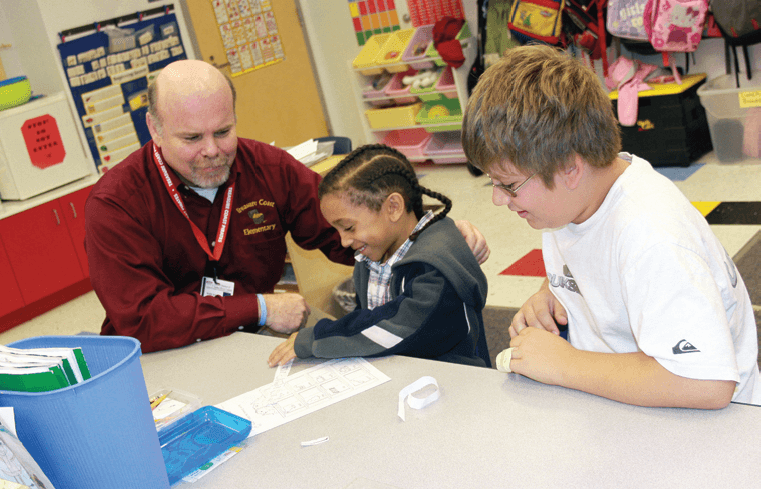A School Principal Shares His Lessons on Prostate Cancer

When Mark Dugan was diagnosed with prostate cancer, shortly after his 55th birthday, he had a lot of people to tell and he wasn’t sure how to tell them.
First were his wife, two adult children, two adult stepchildren, two brothers and a sister. And then, there was everyone at his school.
Dugan has been an elementary school principal in Florida for 24 years, and he helped to start his present school three years ago. The day before the beginning of the 2008-09 school year, he found out he had prostate cancer.
He just couldn’t tell his faculty at the first staff meeting. His assistant principal did it when he left the room.
“At first, I couldn’t say it face to face. And it seems like prostate cancer is 20 years behind breast cancer in talking about it,” Dugan said.
Teaching Moments
As he found out more about the disease and became confident in his choice of treatment, he opened up. His experiences became opportunities for “teaching moments” at his school and with the students.
Dugan was named national innovation administrator of the year in 2007 by Project CHILD.
“Project CHILD aims to make a school into a family. When something happens with family, it’s shared honestly and truthfully and that’s what I decided to do at my school with teachers, students and parents,” Dugan said.
When he returned to school, he talked to his students about cancer and his experiences.
Now, he has lessons to share with everyone.
Sharing Lessons
“My father was diagnosed with prostate cancer at 72 and he told me at the time how important it was for me to get tested. So at 48, a few years later than it should have been, I went for a baseline PSA. It’s hard for me to admit, but I didn’t go back for seven years after that,” Dugan said.
Even then, the only reason he went for a PSA and DRE was because his wife urged him to.
When Dugan got the results of his baseline PSA seven years before, it was 4.3, too high for someone his age. But he didn’t know what a good or bad PSA was, and his internist at the time told him not to worry. Seven years later, with a PSA of 5.7 at diagnosis, he was relieved that the cancer was still contained in the prostate.
“Now, I know that we all should educate ourselves, and I’ve had a few heart to heart talks with my son even though he’s only in his 20s,” Dugan said.
Making Decisions
Dugan had confidence in his local urologist, who explained all the possible option treatments to him during the visit after diagnosis.
“When I asked him, ‘What do you think I should do?’ he said, ‘Go to Chicago. You’re 55 years old. Potency is important. Continence is important. Go to the best.’ And he referred me to Dr. Catalona. I haven’t had a regret since,” Dugan said.
So far, now about five months after the prostatectomy, everything has gone exactly as he hoped,
When his catheter was removed, the nurse handed him a huge maxipad and that evening his wife put a waterproof pad on the bed. He’s needed neither. Dugan had zero incontinence, even with stress. He knows that isn’t the case for all patients, but he’s grateful that it is for him.
His progress with potency is also on schedule.
“I’m doing injections that Dr. Catalona prescribed and I’m taking a low dose of Cialis daily. I can’t thank Dr. Catalona enough, but also, I thank my local urologist. He knew that a man in his 50s should have an experienced nerve-sparing surgeon with a proven record on continence and potency,” Dugan said.
Support
Although his wife, Patti, wasn’t part of the medical team, Dugan attributes a lot of his recovery and good attitude to her.
“We went through this together and I can’t tell you how much it meant to have her with me all the time – at every doctors’ appointment and all night at the hospital.”
Although as a school principal, Dugan knows how important support is, he is still amazed at the effect it had on him.
“People find it hard to believe – but Dr. Catalona and his staff did such a good job of preparing me and making arrangements for us – that my wife and I spent the day and a half before the operation having a good time touring Chicago.
“And the staff from school got us a limousine for the two hour ride to the airport on the way to Chicago and then again for the ride back after my operation.
“I was a man well taken care of,” Dugan said.
Back to School
About a week after he was home, Dugan put on baggy sweatpants to hide his catheter bag and he went to visit the students at school. Then after the catheter was out, he went a few hours a day for two weeks and by week five, he was back for full days.
The whole time, he communicated with teachers, parents and students.When he returned full-time, he was the topic for one of his 4th graders writing prompts where they discuss a subject and then immediately write about it for 20 minutes.
“First we talked about cancer in general and if they knew family or friends who had cancer. So many of these fourth graders knew someone and shared personal stories. Then I told them I had prostate cancer, but it was taken out. I would continue to be checked, but the cancer was gone and I was feeling great.
“It’s sort of amazing to realize that here I am, an elementary school principal in a small town in Florida; yet, my experience with prostate cancer has been a learning experience with an impact much beyond myself,” Dugan said.











